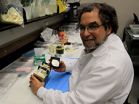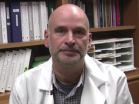(Press-News.org) It's well known how bacteria exposed to antibiotics for long periods will find ways to resist the drugs—by quickly pumping them out of their cells, for instance, or modifying the compounds so they're no longer toxic.
Now new research has uncovered another possible mechanism of antibiotic "resistance" in soil. In a paper published on Dec. 6 in the Journal of Environmental Quality, a group of Canadian and French scientists report on a soil bacterium that breaks down the common veterinary antibiotic, sulfamethazine, and uses it for growth.
Certain soil bacteria are already known to live off, or "eat," agricultural pesticides and herbicides, says the study's leader, Ed Topp, a soil microbiologist with Agriculture and Agri-Food Canada in London, Ontario. In fact, the microbes' presence in farm fields can cause these agrichemicals to fail.
But to Topp's knowledge, this is the first report of a soil microorganism that degrades an antibiotic both to protect itself and get nutrition.
"I think it's kind of a game changer in terms of how we think about our environment and antibiotic resistance," he says.
Concerns about widespread antibiotic resistance are what led Topp and his collaborators to set up an experiment 14 years ago, in which they dosed soils annually with environmentally relevant concentrations of three veterinary antibiotics: sulfamethazine, tylosin, and chlortetracycline. Commonly fed to pigs and other livestock, antibiotics are thought to keep animals healthier. But they're also excreted in manure, which is then spread once a year as fertilizer in countless North American farm fields.
The researchers first wanted to know whether these yearly applications were promoting higher levels of antibiotic resistance in soil bacteria. But a few years ago, they also decided to compare the persistence of the drugs in soil plots that had been repeatedly dosed, versus fresh soils where antibiotics were never applied.
They did this experiment, Topp explains, because of previous work indicating that pesticides often break down more quickly in soils with a long history of exposure, indicating that pesticide-degrading microbes have been selected for over time.
Still, it came as a surprise when they saw antibiotics also degrading much faster in long-term, treated plots than in fresh, control soils, he says. In particular, sulfamethazine—a member of the antibiotic class called sulfonamides—disappeared up to five times faster.
The researchers subsequently cultured from the treated plots a new strain of Microbacterium, an actinomycete that uses sulfamethazine as a nitrogen and carbon source. Extremely common in soil, actinomycete bacteria are known to degrade a wide range of organic compounds. And now at least two other sulfanomide-degrading Microbacterium strains have been reported, Topp says: one from soil and another from a sewage treatment plant.
Taken together, the findings suggest that the capability to break down sulfanomides could be widespread. And if it's indeed true that "the microbiology in the environment is learning to break these drugs down more rapidly when exposed to them, this would effectively reduce the amount of time that the environment is exposed to these drugs and therefore possibly attenuate the impacts," Topp says.
Not that negative impacts aren't still occurring, he cautions. In particular, long-term exposure to antibiotics puts significant pressure on soil bacteria to evolve resistance, which they typically do by giving and receiving genes that let them detoxify drugs, or keep the compounds out of their cells.
What the new research suggests, though, is that soil bacteria could be swapping genes for breaking down antibiotics at the same time.
"My guess is that's probably what's happening, but it remains to be determined," Topp says. "It's actually extremely fascinating."
###
The work was funded by Agriculture and Agri-Food Canada.
Topp is available at 519-457-1470 e.235; ed.topp@agr.gc.ca
The full article is available for no charge for 30 days following the date of this release. View the abstract at https://dl.sciencesocieties.org/publications/jeq/abstracts/0/0/jeq2012.0162.
Antibiotic-eating bug unearthed in soil
2012-12-07
ELSE PRESS RELEASES FROM THIS DATE:
Nicaragua Participates in the 2012 Outsource to LAC
2012-12-07
Nicaragua is currently participating in the Latin American and the Caribbean (LAC) Offshoring and Outsourcing Summit, held in Medellin Colombia from December 4th to the 6th, whose objective is to promote the development of the outsourcing and offshoring industry in the region and establish key contacts between international companies interested in seeking new outsourcing destinations.
The Nicaraguan delegation participating in the summit includes representatives from PRONicaragua, the official investment and export promotion agency of the Government of Nicaragua, and ...
EcigaretteReviewed.com Stands up to Misinformation Surrounding Electronic Cigarettes
2012-12-07
The trusted electronic cigarette review website EcigaretteReviewed.com has hit back against false and misleading claims surrounding electronic cigarettes. News reports from around the world have spurred on the uncertainty surrounding the new nicotine-vaporizing devices, but a glut of scientific research has shown that there is very little to worry about with regards to their safety. It's been claimed that the presence of nitrosamines and diethylene glycol in e-cigarettes renders them a potential health hazard, but the website rallies against these claims, ultimately placing ...
Prompt Proofing Blog Post: Grammar Tips - Further or Farther?
2012-12-07
This one causes confusion for a lot of people. The simplest way to approach it is to use farther when you are talking about physical distance and further when speaking figuratively.
For example:
It would be quicker to fly to Toronto; New York is much farther.
I will have to go a few miles farther to find a gas station open at this hour.
Compare:
If you want to take this further then you can write to the Board of Governors.
We can discuss this further next time.
One easy way to remember is to use farther when you are comparing two places that are far ...
Now Offering Affordable Medical Alert Service by HBD Business Solution
2012-12-07
HBD Business Solutions, a sister company of Help Button Designs, LLC offers affordable Medical Alert Service with round the clock monitoring 24/7/365, Certified Response Associates with two responders per call, no contracts, easy installation, water proof pendants, and customized care plans to connect with family first in the event of an emergency.
The service works by first pressing your waterproof Help Button and you will instantly be connected to a Certified Specialist. Next a Care Specialist assists you any time of the day in any given situation whether emergency ...
Barratts' Blogger of the Week Goes Global!
2012-12-07
The brand aims to give an eclectic mix of fresh and established writers a new platform whilst establishing their credentials in the fashion world and have extended an open invitation to fashion bloggers who would like to take part.
As part of their continual attempts to provide customers and fans with the best possible interactions with the brand, Barratts have launched a new weekly feature highlighting some of the most innovative and stylish fashion bloggers on the Internet. Whilst previously featuring an array of the best from the UK, including the likes of Temporary ...
Kennedy Scientist Leads National Research Society
2012-12-07
For the past year, a NASA scientist at the Kennedy Space Center in Florida has led one of the preeminent microgravity research organizations in the United States. Howard G. Levine, Ph.D., chief scientist in the space agency's International Space Station (ISS) Ground Processing and Research Directorate has served as president of the American Society for Gravitational and Space Research, or ASGSR.
A nonprofit organization founded in 1984, ASGSR provides a forum to foster research, education and professional development in the multidisciplinary fields of gravitational, ...
New Platform for Doctorates of Business Administration (DBA): How Do You Identify a Quality Program in the Absence of Rankings?
2012-12-07
In contrast to MBA programs, Doctorates of Business Administration (DBA) are not covered by internationally recognized rankings. Hence, proxies are needed to assess the quality of a program. The new platform Doctor of Business Administration Compass provides an overview of the five most important quality criteria:
1. Assess the research quality of the faculty.
2. Have a look at accredited programs.
3. Assess the reputation of a school.
4. How experienced is the school in teaching?
5. How well is the school exposed to executives?
The Doctor of Business Administration ...
Visionary in Unpadded Whiteboard Room Affirms 21 Dec is the Beginning of the End - Reaches Out to 99 Influencers for Their Thoughts Via Twitter
2012-12-07
Scott Townsend, a crazy visionary in an unpadded whiteboard room, says "it's the end of the world as we know it, but not like the movie."
As the 21st December 2012 nears, the world will, according to many people, mark the date when we begin to enter a new era of positive change and consciousness.
To help motivate this much-needed transformation, Townsend is starting by reaching out to 99 influential people on Twitter, each with different values, passions and beliefs to discover what they think needs to change.
Townsend hopes that reaching out to each ...
Bilirubin can prevent damage from cardiovascular disease
2012-12-06
COLUMBIA, Mo. -- Each year, about 610,000 Americans suffer their first heart attack, according to the Centers for Disease Control and Prevention. Heart attacks and other symptoms of cardiovascular disease can be caused when blockage occurs in the arteries. In a new study from the University of Missouri, a scientist has discovered a natural defense against arterial blockage: bilirubin.
Bilirubin is typically something parents of newborns hear about when their children are diagnosed with jaundice. Generated during the body's process to recycle worn-out red blood cells, ...
OHSU study shows that a molecule critical to nerve cells increases drammatically during hypertension
2012-12-06
Researchers at Oregon Health & Science University's School of Dentistry have made an important connection between a molecule critical to nerve cells and high blood pressure. Production of the molecule Brain-Derived Neurotrophic Factor (BDNF) appears to increase dramatically in blood pressure-sensing nerve cells during hypertension. The study, published online in the Journal of Neuroscience Research, may someday have implications for the prevention and treatment of high blood pressure, which affects about one in three adults in the United States.
BDNF is essential to ...



